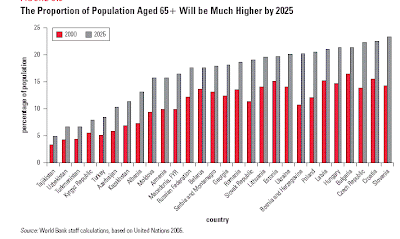On Thursday, CRRC Georgia participated in the presentation of a new World Bank study on the impact of aging in the former Soviet Union. The authors of this study call this the "third transition", the one from From Red to Gray.
The particular challenge is that aging hits most transition countries while they still are poor (so-called "aging late reformers"). By contrast, many Western European countries age when they are fairly well off, and have fairly mature market institutions.
Yet, the authors argue, early action can make this a smooth transition. In particular, they advocate (and here we are quoting practically verbatim):
- increasing the labor supply (by raising the retirement age, creating more flexible work conditions, and improving health of older workers, as well as allowing migration)
- increasing productivity (investing into education and lifelong learning, completing the restructuring agenda/integrating with competitive markets)
Generally, this looks like an exciting study (the website, to advertise it again, is excellent) and the authors, quoting Longfellow, have chosen a good pitch by suggesting that there is as much opportunity in aging as in youth itself. However, at the risk of sounding like a broken record, part of the problem is that early action requires a constructive, sophisticated debate around these issues and much needs to be done to generate the climate in which this debate can take place in the South Caucasus. So far these are niche issues, and we don't even have much data to describe generational change in the region (although we are currently funding one study on this topic) . These presentations seem like a happening at an oasis, when what we need is a much bigger eco-system.
CRRC Georgia did extract a couple of slides from our Data Initiative for our panel presentation. They show that generational change seems less pronounced in Azerbaijan than in the other countries. However, these are just a few snapshots. We're happy to make these available upon request (as well as the Red to Gray book, which we have at CRRC).
